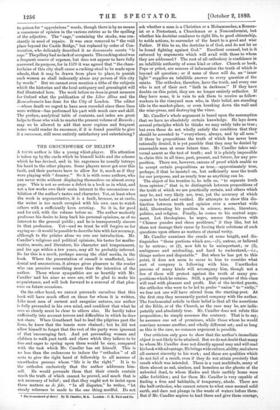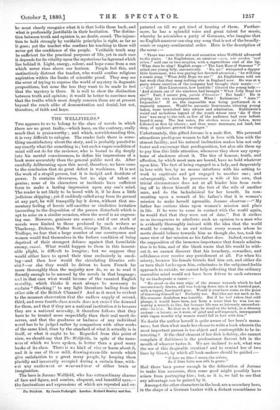THE GROUNDWORK OF BELIEF.*
A YOUNG author is like a young whist-player. His attention is taken up by the cards which he himself holds and the scheme which he has devised, and in his eagerness he usually betrays his hand to the other players. Some players never get over this fault, and their partners have to allow for it, much as if they were playing with "dummy." So it is with some authors, who can never write without displaying themselves on almost every page. This is not so serious a defect in a book as in whist, and not a few works owe their main interest to the unconscious ex- hibition of the author's tastes and character. Yet, at least when the work is argumentative, it is a fault, because, as at cards, the writer is too much occupied with his own case to watch others with a sufficiently keen scrutiny. So it is, for good and for evil, with the volume before us. The author modestly professes his desire to keep back his personal opinions, as of no interest to the general public ; and he is transparently sincere in that profession. Yet—and we trust he will forgive us for saying so—it would be possible to describe him with fair accuracy, although to the printer alone we owe our introduction. Mr. Candler's religious and political opinions, his tastes for mathe- matics, music, and literature, his character and temperament, and his age within a few years, may all be probably inferred. So far this is a merit, perhaps among the chief merits, in the book. Where the presentation of oneself is unaffected, inci- dental and unconscious, it always gives pleasure to the reader who can perceive something more than the intention of the author. Those whose sympathies are as heartily with Mr. Candler-and his aims as ours are, will be glad to make his acquaintance, and will look forward to a renewal of that plea- sure on future occasions.
On the other hand, we cannot persuade ourselves that this book will have much effect on those for whom it is written. Like most men of earnest and sanguine natures, our author is fully persuaded in his own mind, and confident that what he sees so clearly must be clear to others also. He hardly takes sufficiently into account terrors and difficulties in which he does not share. When Greatheart had to lead the pilgrims past the lions, he knew that the beasts were chained ; but he did not allow himself to forget that the rest of the party were ignorant of that 'encouraging fact. And yet persuading women and children to walk past teeth and claws which they believe to be free and eager to spring upon them would be .easy, compared with the task which Mr. Candler has set himself. This is no less than the endeavour to induce the " orthodox " of all sects to give the right hand of fellowship to all manner of unorthodox gersons whose "life is in the right." It is to the orthodox exclusively that the author addresses him- self. He would persuade them that their creeds contain much the truth of which cannot be proved, and much that is not necessary of belief ; and that they ought not to insist upon these matters as de fide. "In all disputes," he writes, "let steady reference be made to the one thing needful. Do not • The Groandsoork of Belfrf. By B. Candler, M.A. London: C. K. Paul and Co.
ask whether a man is a Christian or a Mohammedan, a Roman- ist or a Protestant, a Churchman or a Nonconformist, but whether his doctrine conduces to right life, to good citizenship, to noble actions, to surrender of the heart to a good and wise Father. If this be so, the doctrine is of God, and do not let us be found fighting against God." Excellent counsel, but is it enforced by arguments which will avail with those to whom they are addressed ? The root of all orthodoxy is confidence in an infallible authority of some kind or other. Church or book, Pope or priest, are sources of information the truth of which is beyond all question; or if none of these will do, an "inner light" supplies an infallible answer to every question of the saints. The orthodox, therefore, have the truth, and every one who is not of their sect " lieth in darkness." If they have doubts on this point, they are no longer entirely orthodox. If they have none, it is vain to ask them to receive as fellow- workers in the vineyard men who, in their belief, are standing idle in the market-place, or even breaking down the wall and the wine-press, and destroying the vines.
Mr. Candler's whole argument is based upon the assumption that we have no absolutely certain knowledge. He lays down several principles which he thinks we may safely take as true ; but even these do not wholly satisfy the condition that they should be assented to "everywhere, always, and by all men." If there be propositions the truth of which has never been rationally denied, it is yet possible that they may be denied by reasonable men at some future time. Mr. Candler takes uni- versal assent as the test of truth ; and it is plainly impossible to claim this in all time, past, present, and future, for any pro- position. There are, however, canons of proof which enable us to accept certain propositions as true,—approximately true, perhaps, if that be insisted on, but sufficiently near the truth for our purposes, and as nearly true as anything can be.
The object of his treatise is, he tells as, "to separate truth from opinion ;" that is, to distinguish between propositions of the truth of which we are practically certain, and others which may be, and very likely are, true, yet the accuracy of which cannot be tested and verified. He attempts to show this dis- tinction between truth and opinion over a somewhat wide field, illustrating his position in science, music, literature, politics, and religion. Finally, he comes to his central argu- ment. Let theologians, he urges, amuse themselves with "Chinese puzzles and chess problems," if they like, but let them not damage their cause by forcing their solutions of such questions upon others as matters of eternal verity.
Mr. Candler examines the creeds at some length, and dis- tinguishes "those portions which are,—(1), untrue, or believed to be untrue; or (2), now felt to be unimportant; or (3), ambiguous and misleading, and hard to understand,—i.e., things useless and disputable." But when he has got to this point, it does not seem to occur to him to consider what sort of company is following with him. Unorthodox persons of many kinds will accompany him, though not a few of them will protest against the truth of many pro- positions which he retains. Still, a goodly number of this class will read with pleasure and profit. But of the invited guests, the orthodox who were to be led to prefer " union " to "unity," we fear not one will have stirred from the starting-post. At the first step they necessarily parted company with the author. The fundamental article in their belief is that all the assertions of the Bible, or of the Church, as the case may be, are indis- putably and absolutely true. Mr. Candler does not refute this proposition ; he simply assumes the contrary. That is to say, he assumes one set of premisses, while those whom he would convince assume another, and wholly different set ; and so long as this is the case, no common argument is possible.
Our criticism only goes to show that the author's immediate object is not likely to be attained. But we do not doubt that many to whom Mr. Candler does not directly appeal may and will read his book with advantage. He brings wide culture, ability, and above all earnest sincerity to his work ; and these are qualities which do not fail of a result, even if they do not attain precisely that result which was intended. There is a vast multitude, many of them almost as sad, aimless, and homeless as the ghosts of the unburied dead, to whom Hades and their earthly home were alike forbidden ; and for them Mr. Candler is very capable of finding a firm and habitable, if temporary, abode. There are the half-orthodox, who cannot return to what once seemed solid earth, and dare not plunge in the waste of waters before them. But if Mr. Candler aspires to lead these and give them courage, he must clearly recognise what it is that bolds them back, and what is profoundly justifiable in their hesitation. The distinc- tion between truth and opinion is, no doubt, sound. The injunc- tion to hold strongly by verifiable principles is right, as far as it goes; yet the teacher who confines his teaching to these will never get the confidence of the people. Verifiable truth may be sufficient for the practical purposes of life, yet in each case it depends for its vitality upon the mysterious background which lies behind it. Light, energy, colour, and hope come from a sun which never rises above our horizon. People feel this, and instinctively distrust the teacher, who would confine religious aspiration within the limits of scientific proof. They may see the error of trying to express the world of mystery in dogmatic propositions, but none the less they want to be made to feel that the 'mystery is there. It is well to show the distinction between truth and opinion ; it would be better to convince men that the truths which most deeply concern them are at present beyond the reach alike of demonstration and denial, but not, therefore, of faith and hope.



































 Previous page
Previous page